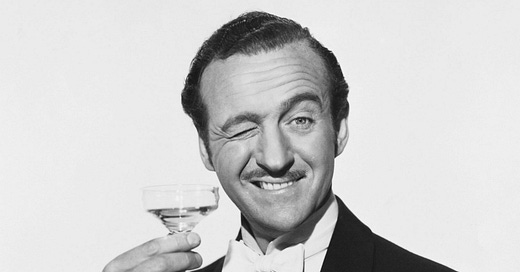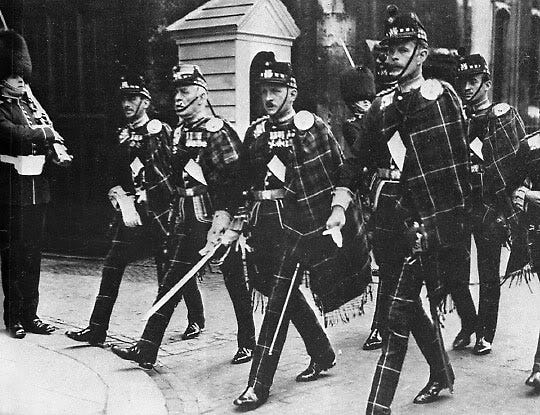“Can you imagine being wonderfully overpaid for dressing up and playing games?”
David Niven was a British actor and author best known for his roles in films such as A Matter of Life and Death, Separate Tables (for which he won the Academy Award for Best Actor in 1959), the Guns of Navarone and The Pink Panther.
Early life
Niven was born on March 1, 1910 in Belgravia, London, England: for some reason, throughout his life he claimed to be born in Kirriemuir, Scotland, as he thought this sounded more romantic.
His father, William Niven, was a British army officer who died during the Gallipoli Campaign of World War I when David was only 5 years old. Niven later wrote in his bestselling memoir The Moon’s a Balloon:
“I had not seen him much except when I was brought down to be shown off before arriving dinner guests or departing fox hunting companions.”
His mother, Henrietta de Gacher, of French descent, was “very beautiful, very musical, very sad, and lived on cloud nine”. She decided to raise him in England, Scotland, and Switzerland after his father’s death.
Widowed and cash-strapped, Henrietta later re-married with the Tory Conservative Politician Sir Thomas Comyn-Platt: given that David had the uncanny physical resemblance of his step-father, many at the time suspected that Sir Comyn-Platt was actually David Niven’s biological father (many decades later, David would confirm that he had always known this).
Niven often got into trouble at school because he liked to play pranks. This got him kicked out of Heatherdown Preparatory School when he was about 10 years old, ruining his chance to go to Eton College, which upset his family. He didn’t do well in math either, so he didn’t pass the test to join the navy.
Instead, he went to Stowe School, a public school. Its headmaster, J. F. Roxburgh, was very different from his old teachers. Roxburgh was nice and let the boys use their first names, ride bikes, and do what they liked.
Niven rememberd him fondly and once said of him:
“I don't know how he did it, but he made every boy feel like they mattered to him.”
Military Career
As a young man, Niven attended the Royal Military College at Sandhurst with the intention of having a military career like his father.
“It was never pleasant to be treated like mud,” he wrote, “but Sandhurst, at least, did it with style.”
After Sandhurst, he requested assignment to the Argyll and Sutherland Highlanders or the Black Watch (Royal Highland Regiment), then jokingly wrote on the form, as his third choice, “anything but the Highland Light Infantry” (HLI), because that regiment wore tartan trews rather than the kilt.
The Command promptly assigned him to the HLI, were he served his subsequent three years (mostly on Malta — where he spent time attempting to lower his handicap playing polo at the Marsa Sports Grounds — and finally, for just a few months, in Dover).
Though promoted to lieutenant on January 1, 1933, Niven saw no opportunity for further advancement of his military career at peacetime.
His ultimate decision to resign came after a lengthy lecture on machine guns, which was interfering with his plans for dinner with a particularly attractive young lady.
At the end of the lecture, the speaker (a major general) asked if there were any questions and Niven asked:
“Could you tell me the time, sir? I have to catch a train.”
He was immediately put under close-arrest for insubordination.
Keep reading with a 7-day free trial
Subscribe to Adorable Times’ Newsletter to keep reading this post and get 7 days of free access to the full post archives.






